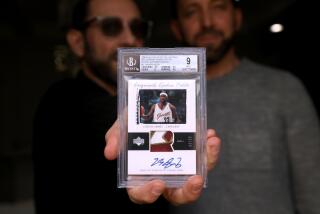HIGH LIFE : Sunny Hills Sophomore Ventures Into Commerce With Help From Dad : A Future in Business Appears in the Cards
- Share via
All businesses--no matter how big or small--start somewhere.
Jeff Jones, a sophomore at Sunny Hills High School in Fullerton, has been building his business, Top Value Trading Cards, for the past year and a half in partnership with his father, William Jones.
The two sell baseball trading cards, operating from William Jones’ office in their Fullerton home. It is a spacious area with a vaulted ceiling and more than enough room for a large oak desk and a computer.
“I started Top Value to gain experience in the business field and for the future and to have fun at the same time,” said Jeff, 16.
He and his father buy boxes of cards at wholesale from the manufacturers and then resell them in smaller increments to individual collectors and small retail stores.
Baseball cards come in complete sets of about 800--one for every player and manager in the major leagues. Or they come in boxes of 36 packages, each containing 15 cards and a piece of gum.
Retailers may order a case of vendors’ boxes that contains from 12,000 to 15,000 cards. Top Value sells them at wholesale prices. But mostly the Joneses sell unopened sets directly from the factory.
There’s room in the baseball card trading field for small resale businesses like Top Value because manufacturers will only sell in major quantities for thousands of dollars, and collectors usually only want to buy in small, single lots.
Prices depend on the value of the cards themselves--higher prices for older cards, rarer cards and those that are especially popular. A complete set of mint cards from the factory can range in price from $18 to $40.
Jeff and his father read baseball card magazines and attend card shows to stay aware of current prices. They will store some of their inventory for the future, when time and scarcity will combine to bring higher prices.
“My dad was always interested in starting his own business,” Jeff said. “When my brother (Greg) started collecting cards, we discovered that his supplier was a girl selling cards to pay her way through college. Her business is full time now. It just grew and grew.
“We could see the potential there because she wasn’t even trying to start a business.”
Jeff’s father supplied the money to purchase the first cards in 1986 and has continued to provide capital whenever it is needed.
“Sometimes, he had to invest several thousand dollars at a time,” Jeff said.
“But now the business is self-supporting. We are even making enough to pay me for my work. It’s a lot more fun to give up your Saturdays when you’re making money for yourself.”
Jeff said he expects his business to triple in profits this year.
To attract customers, Top Value advertises in Baseball Cards magazine, where Jeff’s self-designed ads list available merchandise and provide purchasing information and prices.
“We stress that we’re a family business,” Jeff said, “that we’re not trying to make a million dollars but just trying to have fun. We want our customers to feel that we care for them personally. We sell to both serious collectors and family members.
Top Value has received orders from just about everywhere in the nation, from Puerto Rico to Alaska.
“We even receive letters from little children who address the envelopes in crayon.”
Jeff’s mother, Sandra, takes care of the phone orders during the day, answers questions and takes care of the shipments.
“We keep five different sizes of boxes, tape and shipping labels in the garage. Storage is a real problem,” said Jeff, estimating that they keep “hundreds of thousands” of cards on hand.
William Jones helped to set up the database that lets the family keep track of customers and shipments, but Jeff maintains all the records. He is also responsible for handling the correspondence, depositing the money in the bank, designing the price lists and preparing the cards for shipment.
“It’s hard to do with sports, homework, church activities and being photographer for Accolade (the Sunny Hills newspaper),” Jeff said.
But he believes the business is worth it. “I think it will help me get into college,” he said. “How many applicants will have their own businesses?”
Jeff said he has learned a lot about baseball cards, balancing a checkbook, registering a business with the courts and handling phone orders and general correspondence. But most especially, he has learned about running a business.
“I want to go into business some day,” he said, “and my dad and I feel this is a good steppingstone.”
More to Read
Go beyond the scoreboard
Get the latest on L.A.'s teams in the daily Sports Report newsletter.
You may occasionally receive promotional content from the Los Angeles Times.










